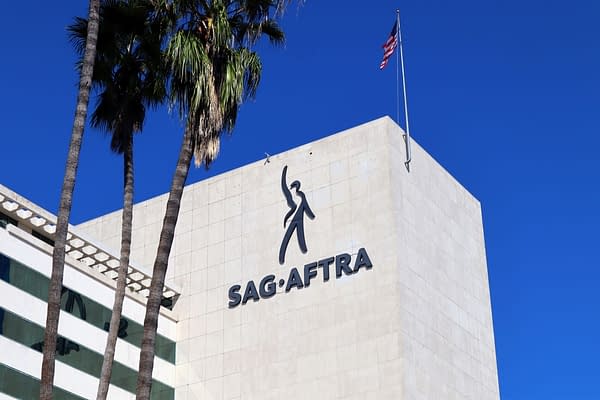Posted in: Movies, streaming, TV | Tagged: amptp, Fran Drescher, matthew modine, SAG-AFTRA
SAG-AFTRA Releases Full Details of Tentative Agreement to Members
As voting on the deal continues, SAG-AFTRA posted the full details of the tentative agreement for union members on Friday afternoon.
Article Summary
- SAG-AFTRA reveals full tentative agreement as members vote on ratification.
- Fran Drescher touts the deal as historic; Matthew Modine urges a 'NO' vote.
- Concerns highlighted around AI's role in the future of actors' digital rights.
- Debate intensifies on the impact of AI on job security and member autonomy.
With the union's membership currently in the middle of voting on whether or not to ratify the tentative agreement between SAG-AFTRA and AMPTP, today marks a very important day for members – the release of the Memorandum of Agreement (MoA), outlining what the new deal would entail. The news of the release was announced on Wednesday by SAG-AFTRA President Fran Drescher, who took to Instagram (see below) to share that all 128 pages of what Drescher describes as "the most lucrative, innovative, and protective contract in entertainment union history." On Thanksgiving – a day before the release – actor Matthew Modine ("Stranger Things" franchise) released a lengthy statement detailing why he will not be voting to ratify the tentative agreement – following his "NO" vote on the agreement as a voting national board member. Much as others like Justine Bateman have argued previously, Modine is calling into question the deal's guidelines & guardrails when it comes to the studios/streamers & AI (for example, the use of digital body imaging) and strengthening the "consent" protections. Now, here's a look at the full document – available for download:
2023 TV/Theatrical Contracts Memorandum of Agreement

Here's a look back at Drescher announcing earlier this week that the full details of the tentative agreement would be available today – followed by a look at the full statement from Modine explaining why he will be voting against ratifying the agreement:
Happy holiday season. There's so much to be grateful for. The Screen Actors Guild-American Federation of Radio and Television Artists (SAG-AFTRA) can be thankful that the prolonged strike is over. We appreciate the negotiation committee and their attempt to arrive at a fair and equitable deal. While there are improvements and gains, I will not vote to ratify the contract. Members should vote their conscience. I cannot endorse a contract that compromises the independence and financial futures of the performers. As a National Board Member, it's morally mandatory to stand beside and provide protection for fellow members. Especially those beginning their careers, those unable to defend themselves, and in this case, their identities, their voices, and their physicality, from being taken away by a technology that no one fully understands. It demands a warning to members that says do not consent to the terms of employment defined by the terms within this contract. Consenting to these terms is a pre-negotiation that will take control of the financial and creative future of every working member of SAG-AFTRA. Consent is surrender.
Within the contract, the word 'consent' is evoked at least a dozen times. It is purposefully vague and demands union members to release their autonomy. Agreeing to consent means contractually giving a go-ahead to our employers to digitally capture and reconstruct our physicality and our voices using artificial intelligence. Once this information is collected, a member can be regenerated whenever and however the contract holder chooses forever.
In a recent 60 Minutes episode, a conversation between Scott Pelley and Geoffrey, "The Godfather of AI," Hinton shared a salient warning regarding artificial intelligence.
Scott Pelley: The risks are what?
Geoffrey Hinton: Well, the risks are having a whole class of people who are unemployed and not valued much because what they–what they used to do is now done by machines.
Scott Pelley: What is a path forward that ensures safety?
Geoffrey Hinton: I don't know. I — I can't see a path that guarantees safety. We're entering a period of great uncertainty where we're dealing with things we've never dealt with before. And normally, the first time you deal with something totally novel, you get it wrong. And we can't afford to get it wrong with these things.
The union's marketing department is enthusiastically telling members to approve this contract. You should know that the expenses of making and mailing fliers, not to mention the salaries of the marketing department, are expenses paid for by members. It's inappropriate for the union to tell a member how to vote without presenting the pluses and minuses of an issue. To do so is disingenuous at best and duplicitous at worst. Members need to understand what they're signing away by consenting as written within this contract.
Consent means surrendering your physical and vocal identity to an employer. A Faustian bargain. If this contract is ratified, every contract moving forward may require, as a condition of employment, members to consent to the use of artificial intelligence as defined by an employer.
Last week, the SAG-AFTRA National Board gathered and sat through what should be described as a Readers Digest explanation of perhaps the most consequential contract in the merged union's history. During that meeting, the National Executive Director (NED) explained that it wasn't necessary to read or discuss the contract in its entirety. Not being fully informed about this contract is like being told that Chicken McNuggets are only made of chicken meat.
Imagine how disappointed members would be if they learned what they were actually being fed. Not sharing the entire contract is irresponsible. Spinning the benefits of the contract as "historic" and "seminal" is as disingenuous as McDonald's saying McNuggets are not grey goop balls filled with chemicals, antibiotics, beaks, ligaments, and chicken butts.
Yes, SAG-AFTRA members will have a right to say "No" when asked to consent. But doing so will no doubt create a three-tier division between members; there will be those members with the financial/career equity to say no and negotiate their own terms. Others will be forced, out of financial or career necessity, to relent and succumb. Surrendering their voices and unique physicality to be digitized and stored within an employer's hard drive and forever owned. The third tier will be those union members who refuse to consent and lose employment opportunities to those who do consent. The fourth tier is the endgame. Tier four won't necessitate consent. It won't contribute any dues to the union. The studios won't have to negotiate with anyone. They won't need teamsters to pick up performers, send them to make up, costumes, or feed them lunch. Level four is the non-union synthesized scab performers digitally cobbled together from dead actors.
Consent, in the context of this agreement, is tyranny. It is submission. If ratified, SAG-AFTRA members who consent will be digitally exploited in ways not clearly defined and are currently beyond our individual abilities to control. The US Government, with all its resources, doesn't know how to create AI guardrails to provide protections for citizens. SAG-AFTRA certainly doesn't have the financial resources or technology to navigate the AI tsunami crashing upon the shores of the entertainment industry.
Ratification of this contract will result in greater job reductions — especially for background and stunt performers. This loss of SAG-AFTRA labor will negatively impact our sister unions, primarily IATSE tradespeople and the Teamsters. The use of AI has already financially impacted voice performers in film, television, advertising, and animated films. It's wonderful having talented performers to voice animated films, but the industry has shown it has no qualms about replacing human actors with digitized "sound-alike" voices. Even monstrously resurrecting voices of performers who are no longer living.
Union means being joined together in cause and common interests. This was demonstrated by thousands of members over the course of the strike. We marched for a stronger union. We marched for a fair deal and protections. We stood together to ensure our work environments were safe. We must continue to demand financial participation in the work we collectively create. Going back to the negotiation room and continuing to work on the issues surrounding AI and consent does not negate nor will it dismantle the benefits the contract now holds. Going back into the negotiating room with a sincere effort to further protect members and to more accurately interpret the rules of 'consent' and the uses of AI is the necessary next step we must make.



















